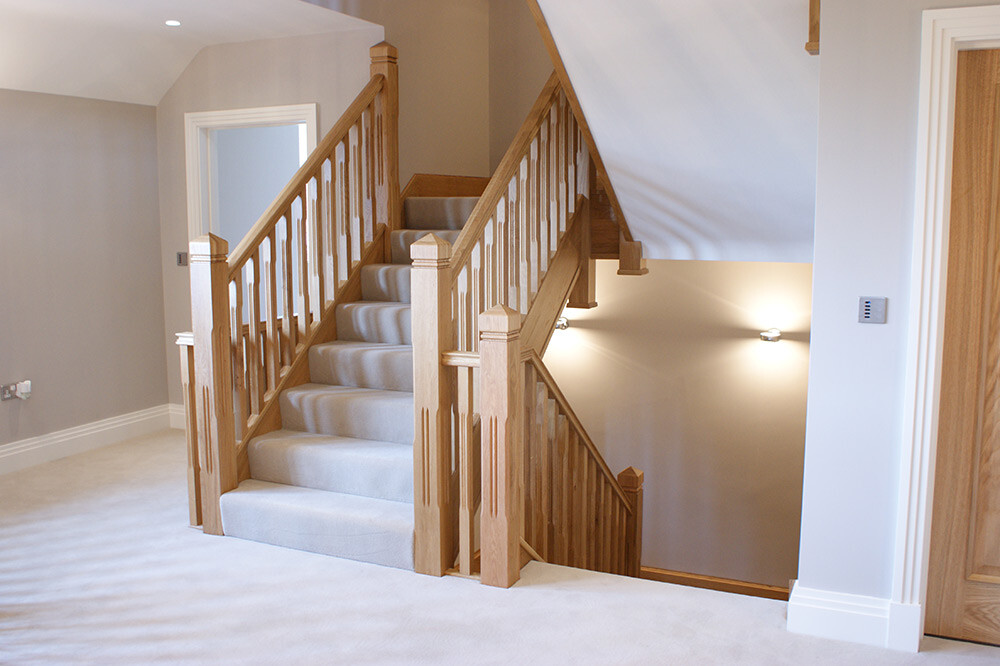News
Bespoke Staircases Made Simple with Input Joinery
Have you been considering a new wooden staircase but are struggling to differentiate your risers from your treads? Input Joinery are here to help; we’ve summarised the most commonly used staircase terminology for you to refer back to when looking for the perfect bespoke staircase for your home.

Staircase Terminology
What is the...
- Tread – the horizontal part of a step you stand on when going up or down the stairs
- Riser – the vertical part of a step which leads up to the tread – can be open or closed
- String – the side where the steps (treads and risers) are housed
- Wall String – similar to a skirting board, this string sits against the wall
- Newel String – the string that runs between the newel posts under the balustrade
- Closed String – a ‘Closed String’ staircase features the string as a solid board, with the edges of the treads and risers (steps) hidden, so you cannot see them from the side of the staircase
- Cut String – a ‘Cut String’ staircase features the string which is cut to follow the shape of the treads and risers (steps), meaning they are visible from the side of the staircase
- String Capping – the top moulding of the string which runs along the wall
- Floor Rail – similar to the string capping, but runs along the length of the landing return
- Newel Post – the post at the start and end of a staircase, often larger and can be decorative to suit the style of staircase
- Half Newel Post – a newel post which is cut in half vertically, usually used where the stairs meet a wall such as a landing
- Newel Cap – the top part of the newel post. Whether you opt for a geometric modern design or one of our standard simple designs for your bespoke wooden staircase is entirely up to you!
- Spindle/Baluster – these are all terms used to describe the vertical inserts which run along the edge of a staircase with the handrail on top, in between the newel posts. This can also be made out of toughened glass for a more modern bespoke staircase
- Handrail/Banister – the handrail runs between the top and bottom newel posts, along the top of the balusters
- Volute – this is the decorative curved start of the handrail, often seen on bespoke wooden staircases
- Stair Nosing – is the horizontal, protruding edge of the step. In some circumstances, a type of stair nosing is a legal requirement for safety reasons, such as increasing grip or step visibility in public areas
- Bullnose Step – the first step at the base of the staircase which has rounded edges and sits slightly further out than the rest of the stairs. Can be against a wall with one curved edge, or open both sides with two curved edges
- Curtail Tread – similar to a bullnose step, but the curved edge is curled round to follow a similar shape to a curved volute, which usually sits on balusters on top of it
- Base Rail/Infill Spacers – this rail sits on the top of the string, where the balusters fit into
- Landing – the area at the very top of the staircase
- Landing Return – the area part way up the stairs where the staircase changes direction – this can be a quarter landing return, where the direction changes by a 90-degree right angle, or half landing return, where the direction changes by 180 degrees and continues back on itself.
Bespoke Staircase Design from Input Joinery
If you’re looking for a bespoke staircase to add a real statement piece to your home, then speak to Input Joinery today. Our sensational bespoke staircases are designed with you from start to finish, so you choose every aspect of the design to ensure that the finished product is exactly what you had in mind. We can also include glass or wrought iron in your wooden staircase design, and we are always looking for innovative new ideas to bring to life.
So, whether you are looking for a closed string staircase, a cut string staircase, an open riser staircase or perhaps you just don’t know where to start, our team of highly experienced Hampshire joiners can talk you through the process. Get in touch today to find out more.
